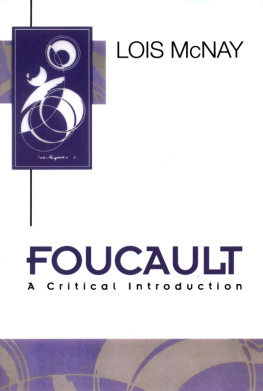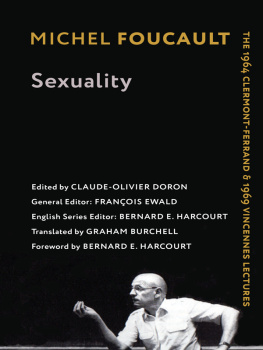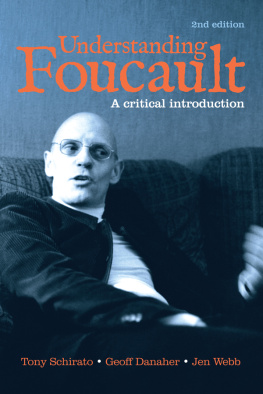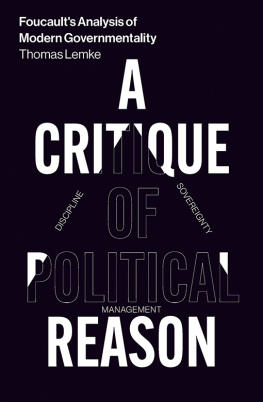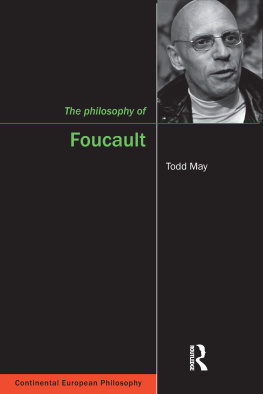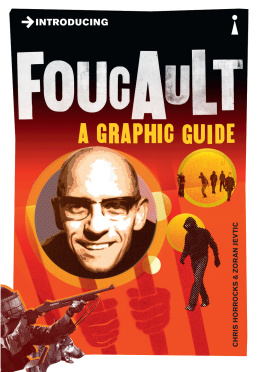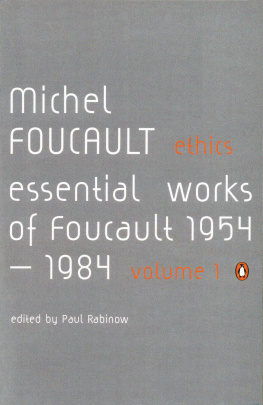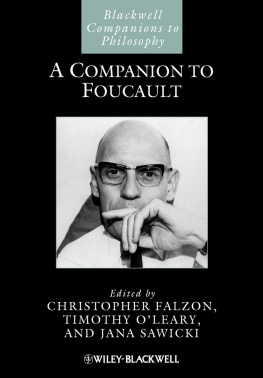Michel Foucault
Michel Foucault
Clare OFarrell
Clare OFarrell 2005
First published 2005
Apart from any fair dealing for the purposes of research or private study, or criticism or review, as permitted under the Copyright, Designs and Patents Act, 1988, this publication may be reproduced, stored or transmitted in any form, or by any means, only with the prior permission in writing of the publishers, or in the case of reprographic reproduction, in accordance with the terms of licenses issued by the Copyright Licensing Agency. Inquiries concerning reproduction outside those terms should be sent to the publishers.
| SAGE Publications Ltd
1 Olivers Yard
55 City Road
London EC1Y 1SP |
SAGE Publications Inc.
2455 Teller Road
Thousand Oaks, California 91320 |
SAGE Publications India Pvt Ltd
B-42, Panchsheel Enclave
Post Box 4109
New Delhi 110 017 |
British Library Cataloguing in Publication data
A catalogue record for this book is available from the British Library
ISBN 0 7619 6163 1
0 7619 6164 X
Library of Congress control number available
Typeset by C&M Digitals (P) Ltd., Chennai, India
Printed on paper from sustainable resources
Printed and bound in Great Britain by Athenaeum Press, Gateshead
To my mother
Deirdre OFarrell
and to the memory of my father
Patrick OFarrell
19332003
Preface
The French thinker Michel Foucault, who died in 1984 aged 57, is one of the most influential sources of ideas in the humanities and social sciences today. His output was enormous, including some twelve books published during his lifetime, four 800-page volumes of his collected articles, interviews and lectures as well as seven recent and very substantial volumes of lectures with more promised. Two previously unpublished sets of interviews also appeared in 2004, 20 years after his death, one set in book form (Droit, 2004) and the other dramatised for radio (1969i). Other material is also available on video, audio tape and CD.
Such an output is daunting indeed and this book is designed as an introductory guide for people who are looking for a broad overview of Foucaults work. It is also aimed at providing some tools for students and researchers who wish to apply Foucaults ideas at more technical levels. The analysis is situated within the general field of cultural studies and is focused on the mechanics of Foucaults approach rather than towards the empirical content of his work. In addition, discussion is mainly restricted to his own work, with only limited references to what is now a very large and very diverse secondary industry.
Introducing Foucaults work is no easy matter. This book takes a layered approach, dealing with the same problems from a variety of angles in an attempt to try and deal with some of the complexities. become famous for. The overall aim is to reduce some of the mystery surrounding Foucaults approach and to increase the flexibility and precision with which people can both understand and use his work.
The book also includes two appendices which are intended to function as working tools. The first is a chronology of Foucaults life, work and other major contemporary intellectual and political events. This is designed to serve as an easy set of historical reference points to ground the more theoretical analyses in the book. The second appendix provides a detailed alphabetical list of Foucaults key concepts. Brief definitions are provided, but more importantly, the aim is to guide the reader to those texts by Foucault himself where he provides definitions and illustrations of what he is trying to convey. Amongst the favorite pastimes of those engaged in the study of Foucault is trying to hunt down specific tools in his work suitable for applications to other domains, or otherwise searching for clarification of particular concepts. The intention of is to make this quest a little easier. For example, someone searching for Foucaults definition of the notion of discourse and how he actually puts this idea into play can look the word up in the appendix and then track down the necessary references.
The inclusion of this list of key concepts has had two consequences for the rest of the book. First of all, it has made it possible to keep the referencing structure within the text itself fairly light and unencumbered. Readers looking for a general introduction to Foucaults work therefore, need not be bothered by complex referencing, whereas those searching for more detailed information on any of his concepts can turn to the list. The inclusion of this list has also necessitated a comprehensive and custom designed bibliography of Foucaults work, in order to make it a tool that can be used not only by English speakers consulting multiple translations of the same work, but also by those working in the original French or with translations into other languages.
With regards to the translations, when the published English translation does not quite convey some of the nuances of the French original, I have modified the translation and added the annotation mod. beside the reference in the text. Translations of texts not yet published in English are my own. Wherever possible, I have referred to the most recent translation of each item in English, otherwise I have listed the most accessible version in French.
Acknowledgements
This book owes much to the ongoing and generous support of many people over a number of years. I would like to begin by thanking my family, in particular my father, who died on Christmas Day 2003, and was a source of constant encouragement, support, advice and intellectual discussion, even through long-term illness. My mother has also been tremendously supportive over the years, as have other members of my family.
I would also like to thank the commissioning editor at Sage publications, Chris Rojek, and the anonymous reader who provided very helpful feedback at the proposal stage. The staff at the Foucault Archives at the Institute Mmoire Contemporaine (IMEC) in Paris helped to make my visit in 1998 a most productive one. Also in Paris, Jean-Paul and Monique Delamotte of the Association Culturelle Franco-Australienne (ACFA) were the source of generous support and hospitality. The Humanities Research Centre and Burgmann College at the Australian National University in Canberra provided excellent research facilities and accommodation in 1999. Thanks are also due to my colleagues in the School of Cultural and Language Studies in Education at Queensland University of Technology (QUT) in Brisbane for their collegial spirit. I am especially grateful to the Head of School, Jillian Brannock for facilitating work conditions in the final stages of completing this book. I would also like to mention the Foucault Reading Group at QUT whose members have provided much lively and interesting discussion.
Colin Gordon, Dominique Sglard, Chris Falzon, Jeremy Carrette, and my two fellow co-editors of the new Foucault Studies journal, Stuart Elden and Alan Rosenberg have all contributed in many ways with their ongoing enthusiasm for Foucaults work. I have also benefited from contact with the many researchers who have contacted me via my website on Foucault (www.michel-foucault.com). They have drawn my attention to far-flung and unexpected applications of Foucaults work across the globe. On the technical side of things, I would like to thank Peta Blackford who typed the final drafts of the manuscript and John Anderson who provided sterling assistance by entering all my bibliographical data.


